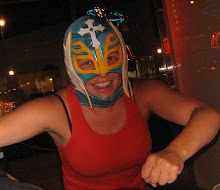Nursing and Technology
This is mainly because this damn song played in my head throughout the entire class last week. Is it stuck in your heads yet?
I've been thinking about this post for a while now and I am finding it really hard to write. My first impulse is to say that I don't care about technology or how it might affect my career. Maybe it is closer to the truth to say that I don't find it that interesting and hope that it will not affect my career in ways that I have yet to understand. Of course I want the increased efficiency and continuity of care that comes with electronic charting, but before listening to last week's ethics lecture, I never really thought about what is lost due to increased technology. When we chart electronically now, our words are chosen for us, we simply click the box that best fits what we see. What happens when our assessments do not fit into one of the chosen boxes? There is a small place at the end of the chart where we can add a comment, but how many nurses take the time to do this? How many nurses on future shifts take the time to read this?
When I think about all of this, a great quote comes to mind. Cate showed it to me. (OK, she also blogged about it - in case it looks familiar.) It was used in one of her grad school books - "Educational Action Research: Becoming Practically Critical," by Susan E. Noffke. While the quote was used for a book about education, I think it can just as easily apply to nursing.
"I am done with great things and big plans, great institutions and big success. I am for those tiny, invisible loving human forces that work from individual to individual, creeping through the crannies of the world like so many rootlets, or like the capillary oozing of water, yet which, if given time, will rend the hardest monuments of human pride." - William James
This has everything to do with what I think of as nursing. This has nothing to do with technology.
While writing this, I am also reminded of one of the nurses I work with on the Blood and Marrow Transplant unit. She has immigrated here from Liberia. If you have payed any attention to the Strib's coverage of the Liberian immigrant issues here in Minnesota, you might recognize her because her family has been the focus of a few articles. As I know her on our unit, she is a great nurse. I believe she has been working on the unit for over 20 years. She knows more than I can currently comprehend about our highest acuity patients. Yet she is still trying to gain citizenship to the United States. Just last week we were in the break room and I noticed she was studying for her upcoming citizenship exam. She told me she had failed her first attempt because it was computerized and since she has never really learned how to type, she cannot complete the exam within the mandatory time limits. Would it be allowed, she could easily take a written format, but since everything must be standardized and electronically graded, she finds herself still waiting for citizenship and unsure of her future in this country. How is this helping?
OK, one more time, but specifically, just the technology part:
Awwwww yeah.

 Maybe I would have been more easily frightened by the scary, sci fi cloning part of this movie if I had watched it in 1978. Now that cloning is a real possibility, the movie takes on a completely different tone.
Maybe I would have been more easily frightened by the scary, sci fi cloning part of this movie if I had watched it in 1978. Now that cloning is a real possibility, the movie takes on a completely different tone. This picture is an example of what pre-implantation genetic diagnosis (PGD) entails. Doesn't it look creepily like the Hitler cloning pic? Eh?
This picture is an example of what pre-implantation genetic diagnosis (PGD) entails. Doesn't it look creepily like the Hitler cloning pic? Eh?
